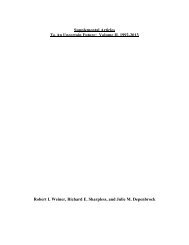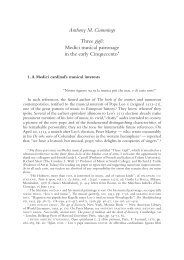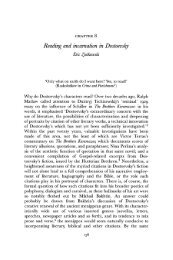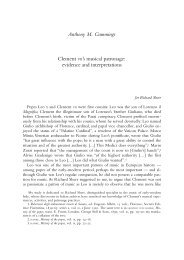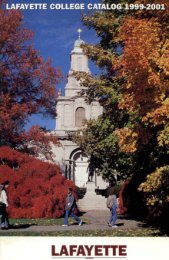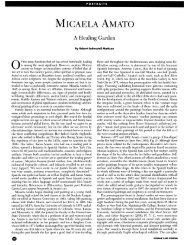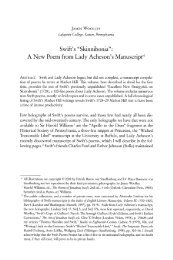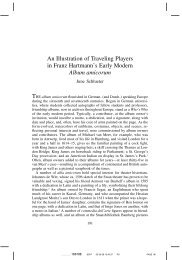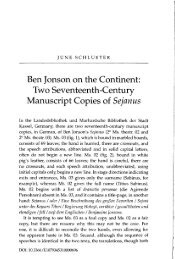Between Religion and Literature: Mircea Eliade ... - Lafayette College
Between Religion and Literature: Mircea Eliade ... - Lafayette College
Between Religion and Literature: Mircea Eliade ... - Lafayette College
You also want an ePaper? Increase the reach of your titles
YUMPU automatically turns print PDFs into web optimized ePapers that Google loves.
<strong>Eliade</strong> <strong>and</strong> Frye<br />
Perhaps the work in which <strong>Eliade</strong> combines his talent as historian of<br />
religions most fully with literary critical insight is his essay "Mephistopheles<br />
<strong>and</strong> the Androgyne, or the Mystery of the Whole,"63 which originally<br />
appeared in the Eranos yearbook of 1959-the same year that Frye suggested<br />
<strong>Eliade</strong> was insensitive to literature. Initially inspired by Balzac's<br />
Seraphita <strong>and</strong> the "Prologue in Heaven" in Goethe's Faust, the essay links<br />
that play, Balzac's novel, <strong>and</strong> a number of German Romantic texts with<br />
the themes of <strong>and</strong>rogyny <strong>and</strong> coincidentia oppositorum in the mythologies<br />
of Greece, the Mediterranean, the ancient Near East, <strong>and</strong> Asia.<br />
<strong>Eliade</strong>'s scholarly invocations of specific literary examples, especially<br />
novels, become more frequent in the years following the appearance of<br />
Frye's review. Thus in 1962, he is astonished to find that Proust uses<br />
"images <strong>and</strong> expressions that had been dictated to me by the behavior of<br />
archaic man studied in The Myth of the Eternal Return: 'new world,'<br />
'destroyed,' 'renewal' of the 'universe,' 'a new world in which nothing<br />
remained of the old."'64 A year later, in pondering Joyce's Ulysses in con-<br />
junction with Australian myths, <strong>Eliade</strong> begins to sense a profoundly suggestive<br />
analogy between the Western epic novel tradition of Balzac,<br />
Tolstoy, Dostoevsky, Dickens, <strong>and</strong> Proust <strong>and</strong> the great mythologies of<br />
Polynesia, India, Greece, <strong>and</strong> elsewhere. "The decline <strong>and</strong> disappearance<br />
of these mythologies opens the way for philosophy <strong>and</strong> literature. It would<br />
have been expected that the 'decline <strong>and</strong> disappearance' of the epic novel<br />
would also lead to philosophy. But James Joyce returns to the monotony<br />
of the w<strong>and</strong>erings of Australian Heroes, filled with religious significance.<br />
We are filled with wonder <strong>and</strong> admiration, just like the Australians, that<br />
Leopold Bloom stops in a bistro <strong>and</strong> orders a beer."65<br />
Although he was often fascinated with works from other genres, such as<br />
Eugene Ionesco's two plays Le pikton de l'air <strong>and</strong> Le roi se meurt, which he<br />
linked to The Tibetan Book of the Dead,66 it is fair to say that <strong>Eliade</strong>'s primary<br />
literary interest was in the novel. In fact, he once thought of writing<br />
a "Theory of the Novel."''67 Had he followed through with that idea he presumably<br />
would have argued in support of the conventional narrative<br />
form, for which he betrayed blatant favoritism. As he attributed his Forbidden<br />
Forest's lack of success to its being "a 'traditional novel,' that is,<br />
written to read," he complained that "the critics <strong>and</strong> the literary elite are<br />
of Myth in Science Fiction," in Mindscapes: The Geography of Imagined Worlds, ed. George E.<br />
Slusser <strong>and</strong> Eric S. Rabkin (Carbondale: Southern Illinois University Press, 1989), pp. 16-33.<br />
63 This essay is reprinted in <strong>Eliade</strong>, The Two <strong>and</strong> the One (n. 34 above), chap. 2.<br />
64 <strong>Eliade</strong>, Journal II, p. 155.<br />
65 Ibid., p. 181; cf. <strong>Eliade</strong>, "Cultural Fashions, pp. 21-22.<br />
66 See <strong>Eliade</strong>, Journal II, pp. 175-76; "Cultural Fashions," p. 21.<br />
67 See <strong>Eliade</strong>,Journal II, p. 62. <strong>Eliade</strong> makes no mention here of the famous essay of that same<br />
title by his Hungarian contemporary, Georg Lukaics (Theory of the Novel, Berlin: Cassirer, 1920).<br />
509



